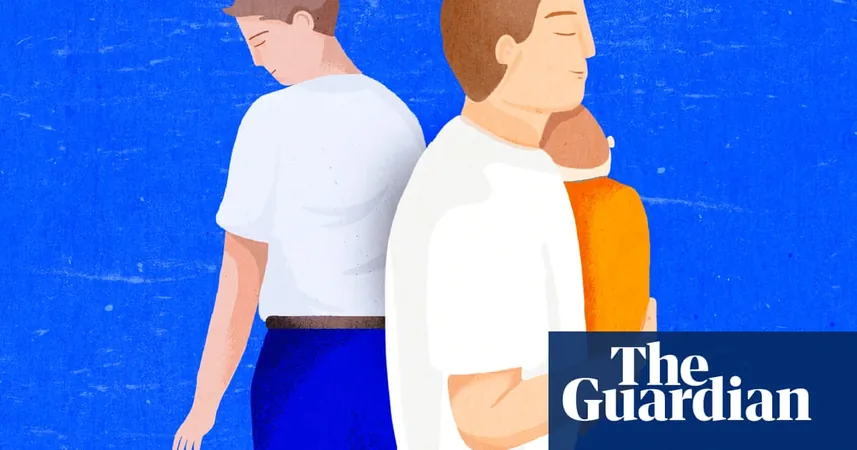
‘Men Are Left in the Shadows’: The Silent Struggles of New Fathers and Why Society Needs to Wake Up
2025-06-01
Author: Li
When Dean Rogut became a father for the first time, life took an unexpected turn. His wife faced complications early in her pregnancy, leading to their premature son, Max, being born at just 24 weeks. As they navigated the harrowing journey through the NICU, Rogut assumed the typical supportive male role, focusing solely on his wife’s needs and overlooking his own.
While everyone checked in on Max’s mother, Rogut found himself emotionally sidelined, struggling in silence. "I was in survival mode, just trying to keep everyone afloat," he said. It wasn’t until months later, as the pressures mounted, that his own mental health took a severe hit, leading him to the hospital with clinical depression.
The Untold Burden of Fatherhood: A Hidden Crisis
Traditionally, society has recognized the mental health challenges faced by new mothers, with up to one in five experiencing perinatal depression or anxiety. Health systems have adopted screening protocols to support them, yet a glaring gap remains: new fathers, like Rogut, lack this crucial support.
Research shows that about 10% of new fathers also undergo serious mental health challenges during this transformative period. The repercussions extend beyond the fathers themselves, affecting their partners and children as well. Jacqui Macdonald, an associate professor at Deakin University, emphasizes that there’s a critical lack of community support for fathers in contrast to the robust systems established for mothers.
Men’s Mental Health: An Invisible Epidemic
For many fathers, the transition to parenthood feels like wandering in a desert, unaware of their deep need for emotional support. A systematic review revealed that many men feel isolated and invisible during their journey into fatherhood, grappling with challenges related to identity shifts, relationships, and financial pressures without adequate resources to address their struggles.
Macdonald points out the systemic issue: "If one part of the family system struggles, the entire system suffers. Caring for fathers is crucial for enhancing their ability to support their partners and children." Yet the structures needed to provide such support remain largely undeveloped.
Changing Expectations: The Role of Fathers in Today’s World
Societal expectations surrounding fatherhood have evolved, with many couples desiring a more egalitarian parenting model. However, the lack of a supportive system often leaves men confused about their roles. Richard Fletcher, from the University of Newcastle, explains the mixed messages from society, which often positions fathers as secondary caregivers.
The transition to parenthood can be particularly difficult for men, who generally bond with their babies at a slower pace compared to women. This dynamic can lead to feelings of disappointment and frustration when reality diverges from the ideals couples had envisioned.
A Call for Change: The Need for Targeted Support
A fundamental shift in how society addresses fatherhood is urgently needed, starting with the implementation of mental health screenings for new dads. While initial steps are being taken in places like the UK, where fathers are screened if their partners face mental health issues, experts argue that broader cultural shifts are essential to normalize support for fathers.
The stigma surrounding fatherhood often leads men to neglect their own needs, sacrificing their mental health for the sake of their partner. "They’re often focused on looking after her, not thinking about their own struggles," Fletcher notes. This neglect can result in dangerous outcomes, including higher suicide risks among fathers.
Promising Solutions: New Initiatives in Fatherhood Support
Innovative solutions like mood-tracking apps and mobile-based support services have shown promise in helping fathers manage their mental health, improve relationships with partners, and reduce isolation. Acknowledging the need for targeted father-specific initiatives is vital to fostering a healthier family environment.
As Dean Rogut reflects on his journey, he sees the importance of acknowledging the shared struggles of fatherhood. Now a champion for perinatal mental health, he recognizes that had he received proper support, his own dark moments might have been alleviated. The question remains: what would’ve changed if society had seen fathers as deserving of support too? "I don't believe I would have ended up in the hospital if there had been more awareness around my struggles," he admits.
Ultimately, addressing the invisible burdens faced by new fathers is not just beneficial for the men themselves, but integral to the health of families as cohesive units.


 Brasil (PT)
Brasil (PT)
 Canada (EN)
Canada (EN)
 Chile (ES)
Chile (ES)
 Česko (CS)
Česko (CS)
 대한민국 (KO)
대한민국 (KO)
 España (ES)
España (ES)
 France (FR)
France (FR)
 Hong Kong (EN)
Hong Kong (EN)
 Italia (IT)
Italia (IT)
 日本 (JA)
日本 (JA)
 Magyarország (HU)
Magyarország (HU)
 Norge (NO)
Norge (NO)
 Polska (PL)
Polska (PL)
 Schweiz (DE)
Schweiz (DE)
 Singapore (EN)
Singapore (EN)
 Sverige (SV)
Sverige (SV)
 Suomi (FI)
Suomi (FI)
 Türkiye (TR)
Türkiye (TR)
 الإمارات العربية المتحدة (AR)
الإمارات العربية المتحدة (AR)